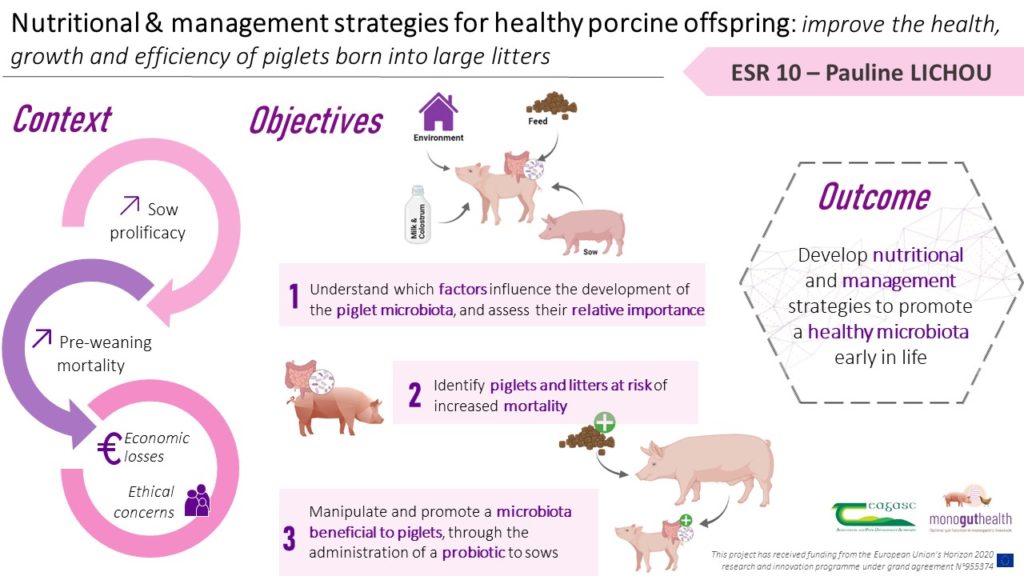ESR10: Nutritional and management strategies for healthy porcine offspring: improve the health, growth and efficiency of piglets born into large litters
Background
The selection for hyperprolific sows has led to an increase in pre-weaning piglet mortality, associated with both reduced birth weight and the reduced volume and quality of colostrumThe first form of milk produced by sows immediately following birth of piglets. Colostrum has an esp… and milk ingested by the individual piglet. This high mortality poses both ethical and economic concerns for the pig industry. Previous research indicates that these losses can be reduced if a healthy microbiota in the piglet intestine is maintained. However, further research is needed to better understand the influence of sow vaginal, faecal, colostrumThe first form of milk produced by sows immediately following birth of piglets. Colostrum has an esp…, milk, udder, environment and diet microbiota on piglet microbiota development. Doing so will facilitate the development of effective microbiota-targeted strategies (e.g. probiotic feeding to sows) to improve the health, growth and efficiency of piglets born into large litters.
Objectives
Identify the influence of sow vaginal, udder, faecal and colostrumThe first form of milk produced by sows immediately following birth of piglets. Colostrum has an esp.../milk as well as environmental and diet microbiomeThe diverse consortium of bacteria, archaea, fungi, protozoa, viruses, and their collective genome f... on piglet intestinal microbiomeThe diverse consortium of bacteria, archaea, fungi, protozoa, viruses, and their collective genome f... development during lactation and subsequent stages.
Determine the importance of sow and colostrumThe first form of milk produced by sows immediately following birth of piglets. Colostrum has an esp... microbiota in developing the piglet intestinal microbiomeThe diverse consortium of bacteria, archaea, fungi, protozoa, viruses, and their collective genome f..., and evaluate their influence on piglet health, growth and feed efficiencyA cumulative efficiency with which livestock like the pig or the broiler utilizes dietary nutrients ....
Early identification of piglets and litters at risk of increased mortality due to reduced immunity uptake from the sow and/or inappropriate intestinal microbiomeThe diverse consortium of bacteria, archaea, fungi, protozoa, viruses, and their collective genome f... colonisation.
Evaluate probiotic administration to the sow and/or progeny as a replacement for antibiotics and pharmacological levels of zinc oxideAn inorganic compound that is commonly used in animal feed as a zinc source. Zinc oxide has been use... and copper in pig diets.
Methods
Sow and piglet microbiomeThe diverse consortium of bacteria, archaea, fungi, protozoa, viruses, and their collective genome f... analysis via high throughput 16S rRNA gene sequencing.
Milk and colostrumThe first form of milk produced by sows immediately following birth of piglets. Colostrum has an esp... composition, microbiomeThe diverse consortium of bacteria, archaea, fungi, protozoa, viruses, and their collective genome f... and immunological analysis.
Growth, feed intake, feed efficiencyA cumulative efficiency with which livestock like the pig or the broiler utilizes dietary nutrients ..., health, intestinal histology and gene expressionA process by which information from a gene is used for protein synthesis. Ultimately this whole proc..., antibiotic usage.
Expected results
ColostrumThe first form of milk produced by sows immediately following birth of piglets. Colostrum has an esp... microbiota and piglet microbiome: find management strategies for peri-partum sows and newborn piglets to enhance passive immunityA situation, when a pig or a broiler receives antibodies against a disease instead of producing them... transfer from sow to offspring and to modulate the establishment of a healthy piglet intestinal microbiota (D2.3) .
Sow microbiota diversity and link to piglet microbiota (D2.12) .
Supplements on sows and offspring growth: find effective supplemental feeding strategies to support intestinal health and overall performance by targeting the most influential microbiota populations for sows and/or piglets and by identifying the optimum period for supplementation (D1.8).
Planned secondments
- At: AFBI (6 mo); Perform experiment to identify piglets and litters at risk of increased mortality due to reduced immunity uptake and/or inappropriate intestinal microbiome
- At: FBN (2 mo); Training in sow milk analysis;
- At: Kiernan Milling (1 mo); Obtain experience in milk replacer and feed formulation for piglets.
Enrolment in Doctoral degree:
ESR10 will be enrolled at the School of Science, Waterford Institute of Technology, Waterford, Republic of Ireland.
Supervisors
Paul Cormican (TEAGASC), Peadar Lawlor (TEAGASC), Gillian Gardiner (WIT)
